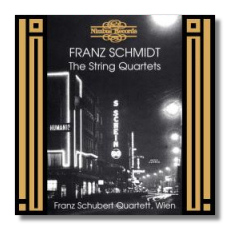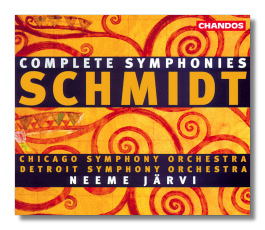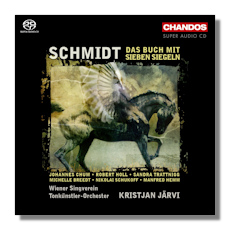
The Internet's Premier Classical Music Source
Related Links
-
Find CDs & Downloads
Amazon - UK - Germany - Canada - France - Japan
ArkivMusic - CD Universe
Find DVDs & Blu-ray
Amazon - UK - Germany - Canada - France - Japan
ArkivMusic-Video Universe
Find Scores & Sheet Music
Sheet Music Plus -
Recommended Links
Site News
Franz Schmidt

(1874 - 1939)
Far better known within Austria than outside it, Franz Schmidt (December 22, 1874 - February 11, 1939) has long been regarded by his countrymen as Bruckner's natural successor. Hungarian was his family's first language, and his music is marked by traces of Hungarian music, particularly as filtered through Liszt and Brahms. A prodigiously musical child, he became adept on piano, cello, and later organ. He first established himself as a cellist in the Vienna Philharmonic. He was considered a great chamber musician and played with the leading ensembles of his day. As a composer, he studied with nobody special, although Bruckner was his counterpoint teacher, and his own composition pedagogy landed no remarkable students. Naturally gifted to an astonishing extent, he achieved a personal synthesis of the Austro-Germanic symphonic tradition. Vienna honored him accordingly.
In addition, Schmidt took a keen interest in the Viennese avant-garde. Schoenberg admired him, especially for his performances of Schoenberg's music. He was particularly grateful for Schmidt's direction of Pierrot Lunaire. None of these Modernist currents made their way into Schmidt's music, however.
Today, we see that his work stands apart from contemporary trends – not especially Brahmsian, Brucknerian, Mahleresque, or Sibelian. Schoenberg, Stravinsky, and Hindemith might as well have never written. One notices similarities to Reger in the chamber music, especially an individual approach to traditional counterpoint. Yet his music moves far more naturally than Reger's. Some critics have seen four phases in Schmidt's music: the first includes the first two symphonies, touched by Bruckner, Strauss, and Reger (1896-1913); the second includes the Third Symphony (1928); the third, the Fourth Symphony (1933), full of stringent dissonance which pulls at tonality without pulling it apart; the last, the magnificent oratorio Das Buch mit sieben Siegeln (1937; the Book of the Seven Seals); and a clarinet quintet (with a piano part for left hand alone, written for Paul Wittgenstein) (1938). Other notable works include the opera Notre Dame, based on Victor Hugo, and two string quartets (1925, 1929).
Schmidt's personal life was a bit of a mess. His wife, mentally unstable, was institutionalized in 1919. His daughter died in 1933 from complications of childbirth (the Fourth Symphony is Schmidt's requiem for her). Schmidt himself suffered from health problems for most of his adult life. Perhaps the cloudiest part of it was his apparent embrace of the Nazis. (Incidentally, the Nazis killed his first wife in 1942, as part of their euthenasia program.) Later testimony from Jewish friends who survived the Third Reich tends to exonerate him, although he did set Nazi texts and gave the Nazi salute. The picture they paint is one of extreme naïveté. Some speculate that this has hindered reception of Schmidt's music. I don't believe it myself. After all, it hasn't hindered the pro-Hitler Webern's posthumous reputation. Until recently, very few non-Austrian conductors and ensembles have programmed Schmidt. I believe they view him as a local phemonenon, satisfying only an inexplicable Viennese taste like Powidl, just as they used to view Nielsen as a composer only vikings could love. However, breakthrough recordings have opened up a small trickle of interest. The Chicago Symphony has recorded symphonies #2 and #3, the London Philharmonic #4. Apparently most conductors need to hear another conductor before they take something up. Schmidt still needs a star to champion him, but the odds look increasingly better. ~ Steve Schwartz
Recommended Recordings
Chamber Music (Quartets & Quintets)
- String Quartets #1 & 2/Nimbus NIM5467
-
Franz Schubert Quartet, Vienna
- Quintet for Piano Left Hand & Strings; Quintet for Clarinet, Violin, Viola, Cello & Piano in B Flat Major/Orfeo C287921A
-
Rainer Keuschnig (piano), Ernst Ottensamer (clarinet), Josef Hell (violin), Peter Wächter (violin), Peter Pecha (viola), Gerhard Iberer (cello), Leonhard Wallisch (cello)a
- Quintet for Clarinet, Violin, Viola, Cello & Piano in B Flat Major; 3 Phantasiestücke, Romance & Toccata for Piano/Marco Polo 8.223415
-
Aladár Jánoska (clarinet), František Török (violin), Alexander Lakatoš (viola); Ján Slávik (cello), Daniela Rusó (piano)
- Quintet for Clarinet, Violin, Viola, Cello & Piano in A Major/Preiser 93357
-
Weiner Kammermusiker
- Quintet for Clarinet, Violin, Viola, Cello & Piano in A Major/Marco Polo 8.223414
-
Aladár Jánoska (clarinet), Stanislav Mucha (violin), Alexander Lakatoš (viola); Ján Slávik (cello); Daniela Rusó (piano)
Symphonies
- Symphony #1-4 (complete)/Chandos CHAN9568/71
-
Neeme Järvi/Detroit Symphony Orchestra
Amazon - UK - Germany - Canada - France - Japan - ArkivMusic - CD Universe
Or Symphony #1 in E Major w/ Strauss Four Interludes/Chandos CHAN9357
Amazon - UK - Germany - Canada - France - Japan
Or Symphony #2 in E Flat Major/Chandos CHAN8779
Amazon - UK - Germany - Canada - France - Japan
Or Symphony #3 in A Major w/ Hindemith Concerto for Orchestra/Chandos CHAN9000
Amazon - UK - Germany - Canada - France - Japan
Or Symphony #4 in C Major w/ Strauss Josephs-Legende/Chandos CHAN9506
Amazon - UK - Germany - Canada - France - Japan - ArkivMusic - CD Universe - Symphony #4 in C Major; Variations on a Hussar's Song/EMI CDC555518-2 or 09463-55693-2
-
Welser-Möst/London Philharmonic Orchestra
- Symphony #4 in C Major; Incidental Music to "Notre Dame"/Pentatone Hyrbid SACD PTC5186015
-
Yakov Kreizberg/Netherlands Philharmonic Orchestra
Das Buch mit sieben Siegeln (The Book of the Seven Seals)
- Das Buch mit sieben Siegeln/Chandos SACD CHSA5061/2
-
Sandra Trattnigg (soprano), Michelle Breedt (mezzo soprano), Johannes Chum (tenor), Nikolai Andrej Schukoff (tenor), Nikolai Schukoff (tenor), Robert Hall (bass baritone), Manfred Hemm (bass), Bijan Khadem-Missagh (violin), Robert Kovacs (organ), Kristjan Järvi/Lower Austrian Tonkünstler Orchestra & Vienna Singverein
- Das Buch mit sieben Siegeln/EMI ZDCB56660-2 or 585782-2
-
Christiane Oelze (soprano), Cornelia Kallisch (alto), Stig Fogh Andersen (tenor), Lothar Odinius (tenor), René Pape (bass), Alfred Reiter (bass), Friedemann Winklhofer (organ), Franz Welser-Möst/Bavarian Radio Symphony Orchestra & Chorus
- Das Buch mit sieben Siegeln/Orfeo C143862H
-
Sylvia Greenberg (soprano), Carolyn Watkinson (alto), Peter Schreier (tenor), Thomas Moser (tenor), Robert Holl (bass), Kurt Rydl (bass), Martin Haselböck (organ), Lothar Zagrosek/Austrian Radio Symphony Orchestra & Vienna State Opera Chorus
















